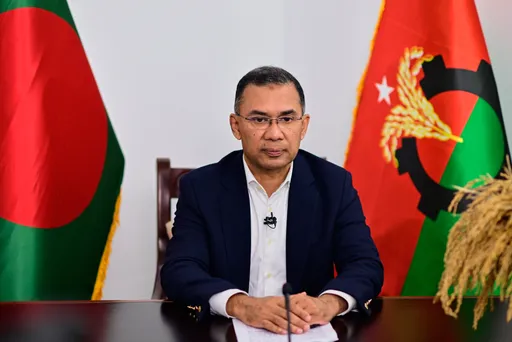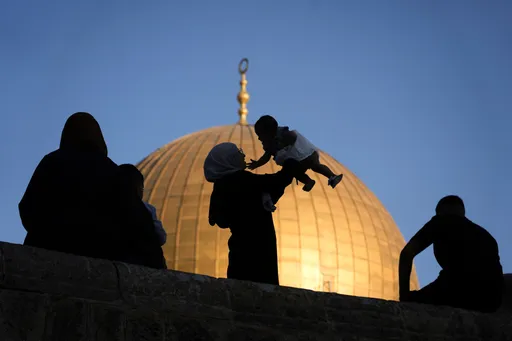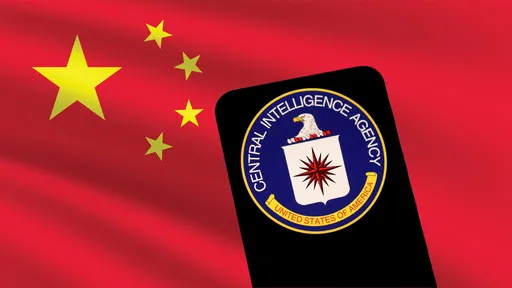The realisation dawned on me just before I met Roger Waters, a music icon and passionate activist.
He, originally from the UK, and I, a Canadian with Italian roots, were about to meet face-to-face in Chile to talk about Palestine.
It was as if the world was coming together – a perfect alignment of the stars in a cosmic moment of truth.
I was in the lobby of a hotel in Santiago, the capital city of the Latin American nation.
And I could hear Roger's distinct voice rising above the general buzz of the public space. It sounded just as it did in the many interviews I've heard him before – a voice with the same energy and expressiveness.
This confirmed that I'd soon be in conversation with someone just as authentic in real life as he appears on-screen.
I stood to shake Roger's hand when he finally entered the room. Much as Roger was on a tight schedule, he didn't show it, much less come across as if he were in a rush. This admittedly helped me feel at ease, too.
Now sitting across from him and waiting for the cameras to start recording, I spoke briefly with Roger about activists, mainly in Canada, we both knew: Dimitri Lascaris, Karen Rodman, Phil Fontaine, etc. He shared with me how he worked with them on various human rights issues, including but not limited to Palestine.
Talking this way provided me with what I felt was a natural segue to open the interview: asking Roger about politics, which I did with a question on when he first noticed Western media's dishonest framing of Palestine as a "problem".
Just before the cameras started rolling, though, Roger and I briefly paused from conversing further. I suppose an interviewer like me could make "small talk" in moments like this. The thought crossed my mind, but I couldn't bring myself to do it.
I felt there was something solemn while sitting across from an important and accomplished person. I didn't want to cheapen that, as it were, by commenting on my flight, the weather, or anything that simply seemed like I was trying to pass the time.
One thing that stands out for me in my interview with Roger is when – movingly – he fought back tears.
This was seemingly in response to a question about how events since October 7, when Israel began violently assaulting Gaza and killing tens of thousands of Palestinians – at the time of writing, nearly 16,000 Palestinians have been killed, over 6500 of whom are children) – had affected him.
It was a natural question to be asked. As I thought it might be a good way to invite him to share how recent months mobilised him in urgent or new ways as part of the larger international struggle for Palestinian liberation.
When Roger nearly cried, I – as now when I reflect on it – was overcome with sadness. I knew at once that Roger felt deep pain towards what's been happening in Gaza. Though he could articulate well what underlies that pain through insightful responses during the interview, it ultimately defies words.
That pain, I also believe, is what currently unites the world, namely the billions who are aware of the devastating loss of life in Gaza – at the hands of Israel – and which is wholly unnecessary. Defenders of Israel say that this is an unfortunate "price" or "casualty" of war. It's a lie.
What's happening in Gaza is not a war but genocide. As Roger remarks in the interview, it's a kind of evil that we cannot even begin to fathom, much as it affects or hurts us from a distance.
But as Roger does – through activism or music– we can channel that constructively. Pain, especially where intermingled with being indignant at injustice (as experienced by seeing Israel brutalise Palestinians), can prompt us to take action to better the world. No doubt that can include contesting the evil.
Further, I think that the story that Roger relates in the interview about how his pacifist father – Eric Fletcher Waters – became an anti-Nazi soldier in World War II should give us pause.
More specifically, as his father was compelled by the evil of the Nazis to bear arms against them effectively, so should we honestly think about what we are willing to do to oppose forces of darkness that threaten our shared humanity.
Such opposition for Roger involves contesting Israel's dehumanising subjugation of the Palestinian people. Though, unlike his father, he does not bear arms in doing so, Roger – in the spirit of his father – is unwavering. His goal is to see the end of the subjugation, which he rightfully views as intolerable.
Underpinned by the false notion that Israel has a right to oppress Palestinians as "non-human", there is nothing redeeming about it. It is driven by hate.
All of us can join Roger, be it through demonstrating, signing petitions, boycotting and so forth, and doing something to help free Palestine from Israeli terrorwhile holding Israel itself accountable. Western governments, as we've long seen, have failed to do so in any substantive way.
By the same token, it's not them but the instructive words of Roger's beloved mother, shared with me during the interview, we should emulate: "Do the right thing".
That seems simple enough, but in today's digital environment, where we are constantly distracted by social media, online consumerism and smartphones, it's not. It requires focus and, in the case of the plight of Palestinians, on others apart from ourselves.
If busy celebrities like Roger, steadfast in his commitment to pro-Palestinian activism, can do this, so can we. Not making the effort, we move further from the possibility that Palestine will be free of Israeli oppression.
That surely cannot be tolerated. Every person is entitled to enjoy a dignified life and not, in contrast to the experience of those in Gaza, constantly suffer.
No one deserves to live in hell.























